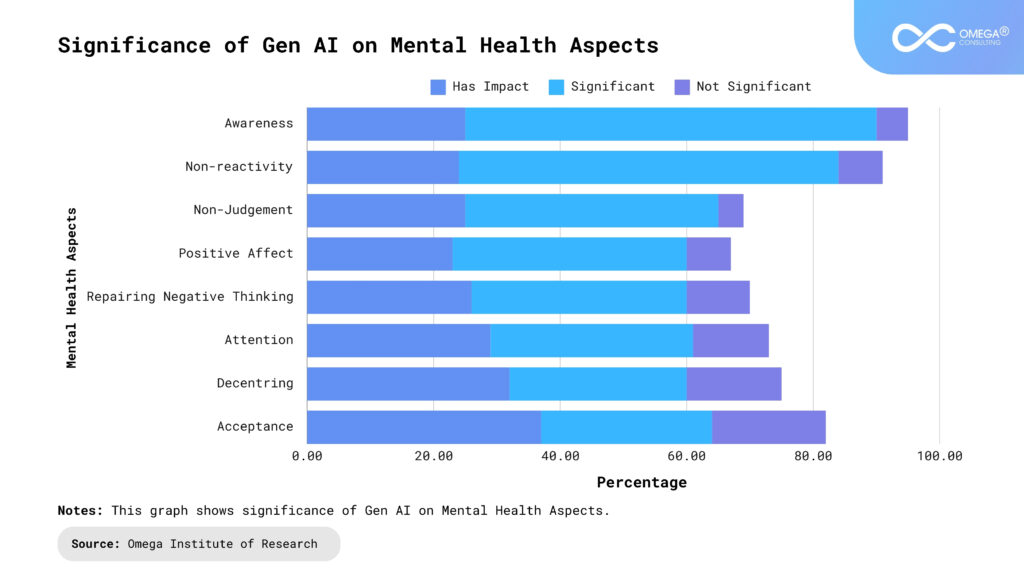- Industries
Industries
- Functions
Functions
- Insights
Insights
- Careers
Careers
- About Us
- Healthcare
- By Omega Team

The intersection of artificial intelligence (AI) and mindfulness has become an intriguing area of exploration. Generative AI, with its capacity for creativity and adaptive learning, has opened new possibilities for enhancing and democratizing meditation practices. This article delves into the profound implications of this synergy, examining how generative AI can transform the way we approach meditation and mindfulness.
The Evolution of Meditation Practices
Meditation has a rich history, rooted in ancient traditions spanning thousands of years. Practices like mindfulness meditation, transcendental meditation, and Zen meditation have evolved to cater to diverse cultural and spiritual contexts. Despite their differences, all forms of meditation share a common goal: achieving a state of deep relaxation and heightened awareness.
In the modern era, the accessibility and popularity of meditation have surged, driven by scientific research validating its benefits for mental and physical health. Meditation apps, online courses, and guided sessions have increased, making mindfulness more approachable for a global audience.

Generative AI: A Brief Overview
Generative AI refers to AI systems that create content, from text and images to music and video. These systems, powered by neural networks and deep learning algorithms, can generate original content by learning from vast datasets. Models like GPT (Generative Pre-trained Transformer) and DALL-E have demonstrated impressive capabilities in natural language processing and image creation, respectively.
The potential applications of generative AI extend beyond content creation to include areas like personalized education, virtual assistance, and even therapeutic interventions. In the context of meditation, generative AI can offer unique contributions by providing customized, adaptive experiences that enhance the efficacy and accessibility of mindfulness practices.

Customization and Personalization
One of the most significant advantages of integrating generative AI with meditation is the ability to offer highly personalized experiences. Traditional meditation practices often rely on generic guided sessions that may not address the specific needs and preferences of individual users. Generative AI can overcome this limitation by creating tailored meditation programs.
For instance, an AI-driven meditation app can analyze a user’s stress levels, sleep patterns, and emotional state to generate personalized meditation sessions. These sessions can adapt in real time based on user feedback and biometric data, ensuring a more effective and engaging experience. By catering to individual needs, generative AI can help users achieve deeper states of relaxation and mindfulness.
Enhancing Guided Meditation
Guided meditation is a popular practice where a teacher or narrator provides instructions to help the practitioner focus and relax. While effective, traditional guided meditation has limitations, such as the static nature of pre-recorded sessions and the potential lack of resonance with the practitioner’s personal experience.
Generative AI can enhance guided meditation by creating dynamic, responsive sessions. An AI system can generate guidance that evolves based on the practitioner’s progress and feedback. For example, if a user is struggling to maintain focus, the AI can offer specific tips and adjustments to help refocus the mind. This adaptability can make guided meditation more interactive and supportive, leading to better outcomes for practitioners.
Virtual Meditation Assistants
The concept of virtual meditation assistants powered by generative AI is another promising development. These assistants can interact with users through natural language processing, providing personalized support and guidance. Imagine a virtual assistant that not only guides you through meditation but also answers questions, offers insights, and tracks your progress over time.
Virtual meditation assistants can be particularly beneficial for beginners who may feel uncertain about how to start or sustain a meditation practice. By offering real-time feedback and encouragement, these AI companions can help users build confidence and consistency in their practice. Moreover, the continuous learning capabilities of generative AI ensure that the assistant becomes more effective and attuned to the user’s needs over time.
Immersive Meditation Experiences
Generative AI can also contribute to creating immersive meditation experiences that engage multiple senses. By integrating AI-generated visuals, soundscapes, and even haptic feedback, meditation sessions can become more profound and captivating.
For example, an AI-driven meditation app can generate calming visualizations based on user preferences, such as serene landscapes or abstract patterns. These visuals, combined with AI-generated ambient music and sound effects, can create a multi-sensory environment conducive to deep relaxation and mindfulness. Such immersive experiences can help users disconnect from external distractions and achieve a more focused and meditative state.
Emotional and Cognitive Support
Meditation is often used as a tool for managing stress, anxiety, and other emotional challenges. Generative AI can enhance the therapeutic potential of meditation by providing emotional and cognitive support. AI systems can analyze users’ emotional states through voice analysis, facial recognition, and other biometric data, offering personalized interventions to address specific issues.
For instance, if a user is experiencing high levels of stress, the AI can generate a calming meditation session focused on stress relief. Additionally, AI can provide cognitive-behavioral techniques and mindfulness exercises tailored to the user’s emotional needs. This level of personalization can make meditation a more effective tool for mental health and emotional well-being.
Accessibility and Inclusivity
Generative AI has the potential to make meditation more accessible and inclusive. Traditional meditation resources may not be available to everyone, particularly those with disabilities or limited access to technology. AI-driven meditation tools can overcome these barriers by offering adaptive and accessible features.
For example, AI can generate audio descriptions and transcriptions for visually impaired users or create simplified instructions for individuals with cognitive disabilities. Furthermore, generative AI can translate meditation sessions into multiple languages, ensuring that non-native speakers can benefit from mindfulness practices. By making meditation more inclusive, generative AI can help a broader audience experience the benefits of mindfulness.

Ethical Considerations and Challenges
While the integration of generative AI and meditation offers numerous benefits, it also raises important ethical considerations and challenges. Ensuring the privacy and security of user data is paramount, given the sensitive nature of biometric and emotional information. Developers must implement robust data protection measures and transparent policies to safeguard users’ privacy.
Another challenge is the potential for over-reliance on AI-driven meditation tools. While AI can enhance meditation practices, it is essential to maintain a balance and encourage users to develop their own mindfulness skills. The goal should be to use AI as a supportive tool rather than a replacement for traditional practices.
Additionally, the development and deployment of AI-driven meditation tools should be guided by ethical principles that prioritize user well-being. This includes avoiding manipulative or exploitative practices and ensuring that AI systems are designed to promote positive and healthy outcomes.

Case Studies
To illustrate the transformative potential of generative AI in the realm of meditation, we will explore several case studies. These examples highlight how AI-driven meditation tools are being implemented and the impact they are having on users.
Case Study 1: Calm’s Personalized Meditation Experiences
Calm, a popular meditation app, traditionally offered pre-recorded meditation sessions and guided meditations by renowned teachers. To address the lack of personalization, Calm integrated generative AI to create customized meditation experiences. The AI system analyzes user data, including stress levels and sleep patterns, to generate tailored meditation sessions that adapt in real time based on feedback and biometric data. Users reported higher engagement and deeper relaxation, attributing the benefits to the personalized guidance that addressed their specific emotional and mental states.
Case Study 2: Headspace’s Virtual Meditation Assistant
Headspace developed a virtual meditation assistant named “Headspace Helper” to provide more interactive and supportive meditation experiences. The assistant uses natural language processing and machine learning to guide users through sessions, answer questions, and offer personalized tips based on real-time interactions. This virtual assistant made meditation more accessible for beginners by providing immediate support and answers, resulting in high user satisfaction and increased retention rates.
Case Study 3: Muse’s Adaptive Meditation Feedback
Muse, a wearable device providing real-time biofeedback, integrated generative AI to enhance its adaptive feedback system. The AI analyzes biometric data during meditation sessions and generates personalized feedback and suggestions for improvement, which are delivered through the Muse app. Users reported significant improvements in the quality of their meditation sessions, reduced stress levels, and a deeper connection to their practice due to the personalized guidance provided by the AI.
Case Study 4: Insight Timer’s AI-Generated Soundscapes
Insight Timer, known for its extensive library of guided meditations and music tracks, introduced AI-generated soundscapes to create more immersive meditation experiences. The AI creates custom soundscapes based on user preferences and real-time data, such as mood and meditation goals. Users found these AI-generated soundscapes highly immersive, aiding in deeper relaxation and mindfulness. The personalized audio experiences led to higher user satisfaction and increased retention.
Case Study 5: Smiling Mind’s Multilingual Meditation Sessions
Smiling Mind, a non-profit offering mindfulness programs, aimed to make meditation accessible globally by integrating generative AI to create multilingual sessions. The AI translated meditation sessions into multiple languages while maintaining the original context. Additionally, AI-generated subtitles and audio descriptions were created for users with visual or hearing impairments. The multilingual sessions enabled Smiling Mind to reach a broader audience, promoting inclusivity and making mindfulness practices more approachable and relatable to non-English speakers.
The Future of AI and Meditation
The future of AI and meditation is filled with exciting possibilities. As generative AI continues to advance, we can expect even more sophisticated and personalized meditation experiences. The integration of AI with emerging technologies like virtual reality (VR) and augmented reality (AR) can create entirely new dimensions of mindfulness practice.
Imagine immersing yourself in a VR meditation session where AI-generated environments and guidance adapt in real time to your emotional and cognitive state. Such experiences can provide unprecedented levels of engagement and effectiveness, making meditation a more integral part of daily life.
Furthermore, the collaboration between AI researchers, meditation experts, and mental health professionals can lead to the development of holistic and evidence-based AI-driven meditation tools. These collaborations can ensure that AI systems are designed with a deep understanding of mindfulness principles and the complexities of human emotions.
Conclusion
The convergence of generative AI and meditation represents a transformative opportunity to enhance mindfulness practices and promote mental well-being. By offering personalized, adaptive, and immersive experiences, AI-driven meditation tools can help individuals achieve deeper states of relaxation and mindfulness. However, it is essential to navigate this integration with ethical considerations and a commitment to user well-being. As we move forward, the synergy between AI and meditation holds the promise of creating more mindful and balanced societies, where technology catalyzes inner peace and personal growth.
- https://fastercapital.com/content/Meditation-AI--Startups-and-the-Power-of-Mindfulness--Exploring-Meditation-AI.html
- https://www.bmc.com/blogs/mindful-ai/
- https://centific.com/mindful-ai-what-it-and-how-get-started
- https://www.appen.com/blog/meditation-and-artificial-intelligence
- https://topai.tools/usecases/meditation
Subscribe
Select topics and stay current with our latest insights
- Functions